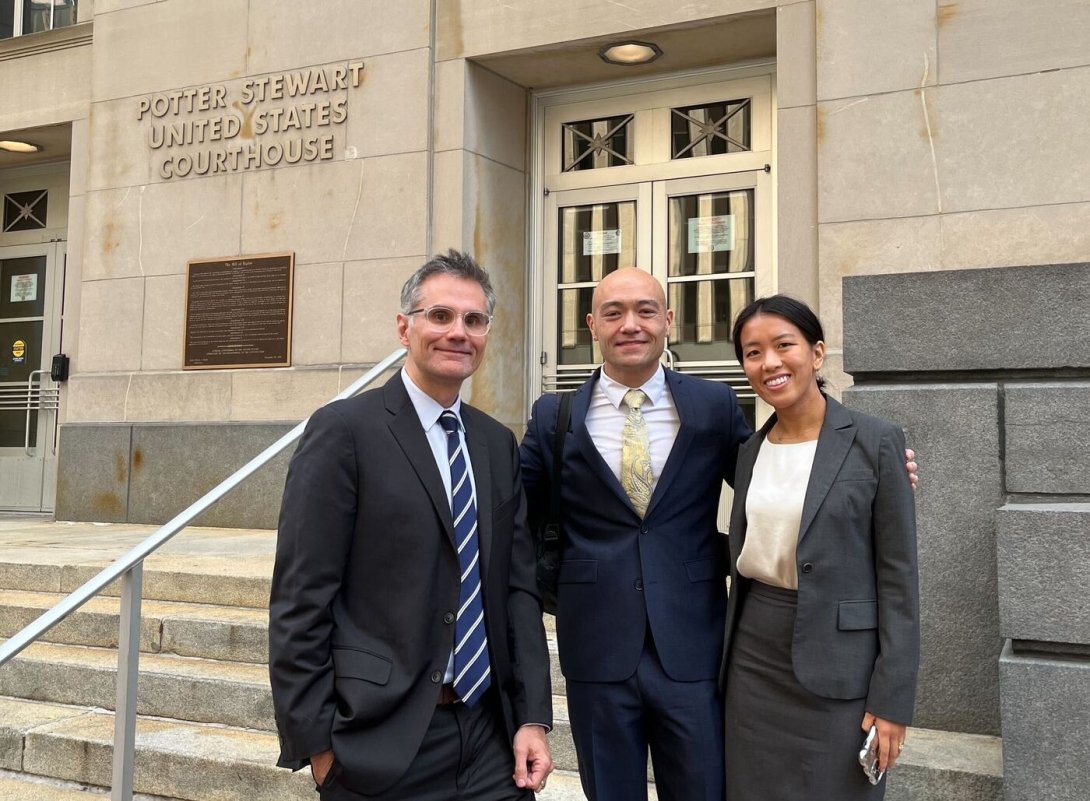The Latest in the 2024 Net Neutrality Court Battle: Oral Argument

Free Press’ Matt Wood and Yanni Chen flank Daniel Woofter, the attorney representing Free Press and allies in the court case
Free Press and its allies are defending the FCC’s Net Neutrality rules and broadband authority in federal court. Our lawyers traveled to the U.S. Court of Appeals for the Sixth Circuit in Cincinnati on Oct. 31 to attend the oral argument in the case. The case landed in Ohio after internet service providers and their trade associations sued in several different circuits to overturn these protections.
Court filings leading up to oral argument in Cincinnati
The oral argument chiefly reviewed the legality of the FCC’s order reclassifying broadband as a telecom service under Title II of the Communications Act — turning more on that important question than on the substance of the Net Neutrality rules themselves. Much of the parties’ briefing coming into the courtroom had focused on whether the Supreme Court’s “major questions doctrine” takes this classification power out of the agency’s hands.
But we also knew that it would be crucial for the court to determine the best reading of the Telecommunications Act’s definitions as they apply to broadband. This court might also have to convey its interpretation of the Administrative Procedure Act in light of a recent Supreme Court decision repealing Chevron deference. Chevron deference — which had set a standard under which courts deferred to reasonable agency interpretation of an ambiguous statute — was central to earlier rounds of this fight. Until the Supreme Court issued its ruling, we had such deference because it permitted agencies to work the way they were designed to.
Free Press’ brief as intervenors in the case supporting the FCC — which we filed jointly with the Benton Institute, the National Association of Regulatory Utility Commissioners, the Open Technology Institute and Public Knowledge — focused on why the major questions doctrine does not apply in this case. We zeroed in on this topic because applying this doctrine could strip the FCC of the power to make this call before the judges even examined the substance of the agency’s decision.
Details of the oral argument
Fortunately, the three-judge panel had weighed the points in our brief leading into oral argument. In particular, Judge Raymond Kethledge wanted to focus counsels’ time on the best reading of the statute, and seemed more interested in the textual analysis than in wading into the major questions doctrine. His preference toward statutory interpretation — where judges analyze laws to determine what they mean and how to apply them, relying on the plain language of the text, legislative history, context and the statute’s purpose — suggests that he at least considered and quite likely agreed with our arguments on why the major questions doctrine should not apply here.
Going into the oral argument, the deck had seemed stacked against us. A different panel of judges had stopped the rules from taking effect before oral argument was scheduled — suggesting the court would favor the industry’s claims, and possibly follow the recent Supreme Court decisions and doctrines outlined above. But all of the judges seemed open-minded and asked hard questions of both sides. Based on the questions posed, it seemed like the panel was earnestly engaging with the issues and that there isn’t an obvious outcome.
Our outside counsel, Daniel Woofter, argued after the FCC, and he was able to clarify our positions and expertly answer the judges’ questions. The judges even noted how much substance he was able to pack into his allotted five-minute argument time, and applauded the agency and all of the parties for their work on this highly technical case.
The decision in this case could potentially impact agency authority more broadly — not only for the FCC but for other federal agencies as well — depending on the 6th Circuit’s interpretation of the major questions doctrine and the post-Chevron landscape. But no matter how it turns out, Free Press will continue fighting to ensure that internet access is truly available, affordable and free of discrimination for everyone.
Help Free Press keep fighting to save Net Neutrality: Donate today.